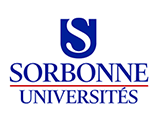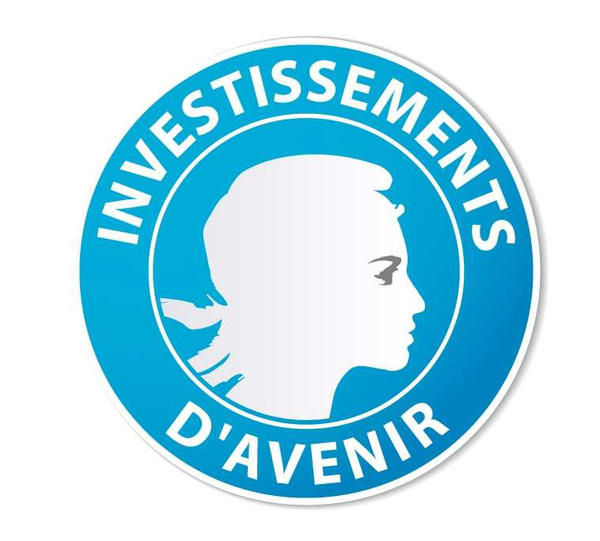Lectures (2015)
Julien Sarrazin - Aziz Benlarbi-Delai (L2E)
Wireless Communication and Localization in the Context of Body Area Network 
Aziz Benlarbi-Delaï is professor of electronics at UPMC. He is Director of the Electronics and Electromagnetism Lab (L2E) and member of the Strategic Orientation Committee of the LabEx SMART. His main research activities deal with high channel modelling for wireless communication and localization in the context of Body Area Network. In the recent past, he was also involved in ultra fast sampling devices and plasmonic structures using micro and nano technology.
Frédéric Bevilacqua (IRCAM)
Modelling Movements and Interaction: from music to rehabilitation 
Frédéric Bevilacqua is head researcher at IRCAM in Paris and leads the team Sound Music Movement Interaction (part of the joint research lab Science & Technology for Music and Sound-IRCAM-CNRS-UPMC). His research concerns the modelling and the design of interaction between movement and sound, and the development of gesture-based interactive systems. He holds a master degree in physics and a Ph.D. in Biomedical Optics from EPFL in Lausanne. He also studied music at the Berklee College of Music in Boston (1992-93) and has participated in different music and media arts projects. From 1999 to 2003 he was a researcher at the Beckman Laser Institute at the University of California Irvine. In 2003 he joined IRCAM as a researcher on gesture analysis for music and performing arts. He co-authored more than 120 scientific publications and 5 patents. In 2006 he was the co-chair of the international conference on New Interfaces for Musical Expression. He has been keynote speaker or invited speaker at several international conferences such as Audio Mostly'13 and ACM TEI’13.
Laurent Boudin (LJLL)
Kinetic modelling of opinion formation, the example of the Scottish independence referendum in 2014 
Laurent Boudin is associate professor in mathematics at UPMC since 2001, and a member of the Jacques-Louis Lions Lab (LJLL). His research activities are mainly focused on the applications of mathematics for complex systems in social sciences and in fluid mechanics (engineering, life sciences).
Antonio Camurri (Casa Paganini – InfoMus Research Centre, DIBRIS, University of Genova)
Interactive mobile systems for social active experience of audiovisual content 
Details here
Antonio Camurri, PhD in Computer Engineering; Full Professor at University of Genova; Founder and scientific director of the Casa Paganini - InfoMus Research Centre of University of Genoa. Main research interests include computational models of non-verbal expressive gesture and social signals, multimodal interactive systems for performing arts (music, dance), cultural heritage (museums), therapy and rehabilitation. Coordinator and local project manager of several European projects and of industry contracts. Co-owner of patents on software and multimedia systems.
Selection of scientific papers:
ftp.infomus.org/pub/Staff/AntonioCamurri and www.siempre.infomus.org.
Video demos:
www.youtube.com/InfoMusLab
Web: www.casapaganini.org
Marie-José Caraty (Paris Descartes University)
Conflict and Dialogue: Detecting Speech Interruptions for Automatic Conflict Detection 
Professor Marie-José Caraty received her PhD in Computer Science at the Pierre and Marie Curie University (UPMC) in 1987. From 1988 till 2000, she was Assistant Professor at the UPMC. She was a founding member of LAFORIA (Pattern Recognition and Artificial Intelligence laboratory, UPMC) and LIP6 (Computer Science Research laboratory, UPMC) where she managed the Speech Recognition team from 1992 till 2000. During this period, she participated to international challenges on Vocal Dictation (AUPELF, 1997) and Speaker Recognition (NIST, 1998). She received her accreditation to supervise research (HDR) from UPMC in 2000. She is currently a professor of Computer Science at the Paris Descartes University. In 2000, she created the DIADEX (Dialog and Indexing) research team in the Computer Science Research laboratory of Paris Descartes University. She participated to international paralinguistic challenges (ComPare) with an Award in 2012. In 2014, she joined the Sens Text Informatics History (STIH) interdisciplinary laboratory of Paris Sorbonne University where she manages the Speech and Text Paralinguistic research team.
Matthieu Cord (LIP6)
Metric Learning in Computer Vision 
Similarity and distance metrics play an important role in both human cognitive processes and artificial systems for recognition and categorization. How to appropriately measure the distance or similarity is crucial to the performance of many machine learning systems. This talk provides a general overview of metric learning through the presentation of a few key algorithms and analytical frameworks. First, we cover linear and nonlinear methods and how to scale them up to large datasets. Second, we show the relevance of metric learning in the very active field of computer vision. We introduce approaches specifically designed for various tasks as image retrieval, face identification, hierarchical image classification, ... and present experimental results on real-world computer vision datasets, and connections to deep learning.
Marco Cristani (Università degli Studi di Verona)
From groups to crowds: a social signal processing perspective 
Details here
Cristani Marco (Ph.D.) is associate professor since 2014 at the Università degli Studi di Verona, Department of Computer Science, where he teaches and does research within the VIsion, Processing and Sound lab (VIPS). He is also Associate Member of the National Research Council (CNR) and Research Affiliate with the Istituto Italiano di Tecnologia, Genova, Italy, where he was Team Leader since 2009-12. His interests are focused on generative modeling and in particular on generative embeddings, with applications on social signal processing and multimedia. Prof. Cristani is co-author of more than 130 papers on important international journals and conferences. He is in the technical program committee of social signalling, pattern recognition conferences and organizer of social signalling/video surveillance. He also organized several PhD schools on the same topics. He has been invited speaker of international conferences and schools of video surveillance and social signal processing. He has been Doctoral Symposium Co-chair for the ACM Multimedia conference 2013, the 16th ACM International Conference on Multimodal Interaction 2014, and Area Chair for the WACV 2015, ICME2015. He is Associate Editor for PLOS ONE, Neurocomputing and Pattern Recognition Letters, and Review Editor for Frontiers. Finally, prof. Cristani is also member of the IEEE, ACM and of the IAPR.
Patrick Garda (UPMC)
Intelligent medical devices and systems for telemedicine 
Patrick Garda is professor of electronics at UPMC. He leads the national network on “Systems-on-Chip / Systems-in-Package” (GDR N°2995 of the CNRS) and the SYEL research group in the computer science laboratory (LIP6) at UPMC. He is also scientific vice-director of the ICT area at the french Ministery of higher education and research and member of the SMART Labex executive committee. Much of his research has been devoted to smart sensors and electronic embedded systems. His current research interests include connected devices, their power consumption and their applications to health and affective computing. Specifically he was leading the ENDOCOM ANR project on implanted sensors and he is currently involved in the Smart-EEG FUI project on tele-medicine.
Daniel Gatica-Perez (IDIAP)
Social media, crowdsourcing, and human behavior analysis:
1- Understanding conversational behavior in social video 
2- Mining urban trends from mobile social data 
Daniel Gatica-Perez directs the Social Computing Group at Idiap Research Institute and is Professeur Titulaire at the Swiss Federal Institute of Technology in Lausanne (EPFL), Switzerland. His work integrates methods from ubiquitous computing, social media, machine learning, and social sciences to understand human and social behavior in everyday life. Among recent activities, he has served as Associate Editor of the IEEE Transactions on Multimedia, Program Chair of the ACM International Conference on Multimodal Interaction 2011, the IEEE International Symposium on Wearable Computers 2013, and the ACM International Conference on Multimedia 2013, and Chair of the Nokia Mobile Data Challenge 2012.
Dan Istrate (UTC)
Ambient assisting living and biomedical sensors : architecture, communication and data fusion 
Dan Istrate received his PhD degree in signal processing from the Institut National Polytechnique de Grenoble (INPG), Grenoble, France, in 2003. He has obtained his habilitation to conduct research (HDR) diploma in 2011 from Université d’Evry Val d’Essonne. Currently is responsible of the EBiomed (Biomedical connected tools) in the framework of Institut Universitaire de l’Ingénierie de la Santé (IUIS) from Sorbonne Universités. His main research topics are: sound environment analysis, multimodal data fusion using fuzzy logics and evidential networks, real time implementation on embedded systems. Dan Istrate works currently on a FUI project EMonitor’age which develop a remote monitoring system for nursing homes and on an ANR project ESwallHome which work on the rehabilitation at home for patient after stroke. He is participated to 6 National, 1 European and 2 International Projects like: CompanionAble (FP7), QuoVADis (TecSan2008) and Sweet-Home (VERSO2009). He supervises 5 PhD students.
Matthieu Latapy (LIP6)
Link Streams for the Modeling of Interactions Over Time 
Matthieu Latapy is a CNRS senior researcher, head of the Complex Systems departement of the LIP6 laboratory, hosted by University Pierre and Marie Curie, Paris, France. He works on all kinds of questions related to complex networks like the internet, the web, peer-to-peer exchanges, social networks, etc. He is particularily interested in the identification of research questions transversal to many of these objects (including metrology, analysis, modeling, and algorithms), and their resolution as well as practical applications. He introduced recently the concept of link streams to model the dynamics of interactions better than dynamic graphs, and works mainly on this topic now. He published numerous papers in high-quality international journals and conferences in computer science, physics, mathematics and sociology.
Catherine Pelachaud (LTCI)
Modeling socio-emotional agent 
Catherine Pelachaud is a Director of Research at CNRS in the laboratory LTCI, TELECOM ParisTech. Her research interest includes embodied conversational agent, nonverbal communication (face, gaze, and gesture), expressive behaviors and socio-emotional agents. With her research team, she has been developing an interactive virtual agent platform GRETA that can display emotional and communicative behaviors. She has been involved and is still involved in several European projects related to believable embodied conversational agents, emotion and social behaviors. She is associate editors of several journals among which IEEE Transactions on Affective Computing, ACM Transactions on Interactive Intelligent Systems and Journal on Multimodal User Interfaces. She has co-edited several books on virtual agents and emotion-oriented systems. She participated to the organization of international conferences such as IVA, ACII and AAMAS, virtual agent track.
Joe Saunders (University of Hertfordshire)
Naturally Acquiring Words through Interaction - Experiments with the ICub humanoid robot 
Joe Saunders is a Senior Research Fellow in the Adaptive Systems Research Group of the University of Hertfordshire, UK. He has carried out research in a number of European projects (COGNIRON, ITalk, ACCOMPANY) concerned with robot adaptation and learning at both a physical and linguistic level. He is especially interested in applying theoretical techniques for robot learning in real-world everyday environments.
Liane Schmidt (INSEAD)
Catching the mind: how to harness the determinants of human behavior by combining psychometric, computational and neuroimaging tools 
Liane Schmidt is a postdoctoral fellow at INSEAD and the Laboratoire de Neurosciences Cognitives at ENS. Her scientific background stems from cognitive and decision neurosciences. She earned her PhD at UPMC Paris, for her investigation of incentive motivation in humans. Her research interests aim at a better understanding of the neural underpinnings of expectancy effects on memory, learning and decision-making in healthy humans and patients with psychiatric, neurological and nutritional disorders. In her current work at INSEAD she investigates how expectancy is affected by gut signals on a behavioral and neural level.
Björn W. Schuller (University of Passau, Imperial College)
Machines' Learning on Social Behaviour Sensing 
Björn W. Schuller received his diploma in 1999, his doctoral degree in 2006, and his habilitation and was entitled Adjunct Teaching Professor in 2013 from TUM (Munich University of Technology) /Germany where he headed the Machine Intelligence and Signal Processing Group from 2006 to 2014. At present, he is Full Professor and head of the Chair of Complex and Intelligent Systems at the University of Passau/Germany where he previously headed the Chair of Sensor Systems in 2013. At the same time he is an Associate Professor in Machine Learning at Imperial College London/UK since 2013. Further, he is the co-founding CEO of audEERING UG (limited). Since 2013 he is a permanent Visiting Professor/Associate at the Harbin Institute of Technology/P.R. China and at the University of Geneva/Switzerland. In 2012 he was with Joanneum Research in Graz/Austria - currently he is an expert consultant of the institute. From 2009 to 2010 he was with the CNRS-LIMSI in Orsay/France. Best known are his works advancing Machine Learning for Affective Computing. Dr Schuller is president of the Association for the Advancement of Affective Computing (AAAC, registered Charity in the UK), elected member of the IEEE Speech and Language Processing Technical Committee, Senior Member of the IEEE, and member of the ACM and ISCA and (co-)authored 5 books and more than 450 publications (>8000 citations, h-index = 44). He is Editor in Chief of the IEEE Transactions on Affective Computing, associate and repeated guest editor for the Computer Speech and Language, associate editor for the IEEE Signal Processing Letters, IEEE Transactions on Cybernetics and the IEEE Transactions on Neural Networks and Learning Systems, and guest editor for the IEEE Intelligent Systems Magazine, Neural Networks, Speech Communication, Image and Vision Computing, Cognitive Computation, and the EURASIP Journal on Advances in Signal Processing and organizer of the INTERSPEECH 2009-2015 annual Computational Paralinguistics Challenges and the 2011-2015 annual Audio/Visual Emotion Challenges and program chair of the ACM ICMI 2013, IEEE SocialCom 2012, and ACII 2011 and 2015, area chair of the ACM Multimedia, IEEE ICASSP, IEEE ICTAI, EURASIP EUSIPCO. He won several awards in the field and is recipient of an ERC Starting Grant 2013 (9% acceptance rate), beneficiary in the (EC) Horizon 2020 (R)IA projects ARIA-VALUSPA, MixedEmotions, and SEWA (9/12/9% acceptance rate) and the ERC Proof-of-Concept grant VocEmoApI. Previously, he coordinated the ASC-Inclusion STREP project and was a partner in the awarded SEMAINE project and the ERC Advanced Grant PROPEREMO (all FP7).
Charles Tijus (LUTIN LIVING LAB, City of Science and of Industry, Paris)
Digital Cognitive Technologies and User's behavior: usability as a balance between internal and external representations 
2014 IBM faculty awards recipient, Charles Tijus heads the “Laboratoire des Usages des Techniques d’Information Numériques” (LUTIN), which is both an "USERLAB" and a "LIVING LAB”, a platform for usability observations and experimentations located at the "Cité des Sciences et de l'Industrie" in Paris. For his own research, he develops a contextual categorization based approach in order to study the cognitive processes of action understanding that are based on thinking, reasoning, decision-making and learning. This concern on adaptive behavior is about how people are developing abilities and competencies when using devices through experiments and models of ongoing behavior (body, hands, eyes), of processes of understanding (knowledge activation), of planning and of decision-making for acting, tasking and problem solving. The methods comprehend empirical research, eyes-tracking, event-related potentials (ERPs) and computer models for cognitive simulations. The current interdisciplinary and collaborative research (cognitive psychology, neuroscience and computer science) is on the understanding of operative language (action grammars) and of figurative language (metaphors).
Alessandro Vinciarelli (University of Glasgow)
Social Signal Processing: Moving Towards New Interaction Contexts 
Alessandro (www.dcs.gla.ac.uk/vincia) is with the University of Glasgow (School of Computing Science and Institute of Neuroscience and Psychology). His main research interest is Social Signal Processing, the domain aimed at modelling analysis and synthesis of nonverbal behaviour in social interactions. Overall, he has published over 100 works, including one authored book, six edited volumes, and 30 journal papers. Furthermore, he has co-chaired 25 international events, including the IEEE International Conference on Social Computing (2012), and he will be general chair of the ACM International Conference on Multimodal Interaction in 2017. He has been PI or co-PI of over 10 national and international projects, including a European Network of Excellence (www.sspnet.eu). Last, but not least, Alessandro is co-founder of Klewel
(www.klewel.com), a knowledge management company recognized with several awards.

